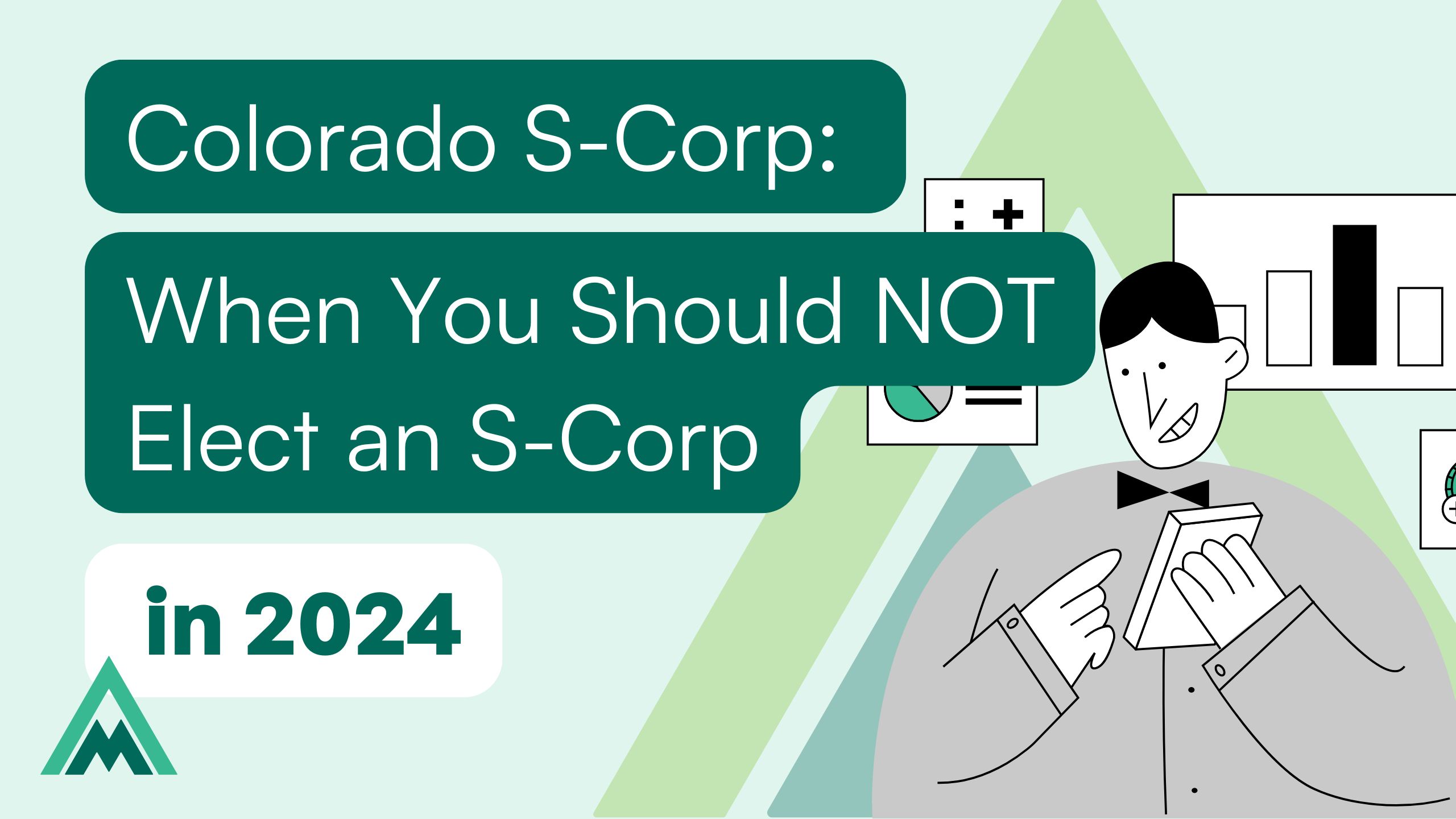Let’s talk Colorado S-Corps.
Choosing the right tax structure is a big decision for any Colorado small business. While an S-Corp can offer benefits like limited personal liability and avoiding double taxation, it’s not always the best fit.
Navigating complex IRS rules and Colorado’s shifting tax laws can feel like walking a tightrope, especially for businesses trying to stay above water. The decision to elect S-Corp status in Colorado can significantly impact your business’s flexibility and growth potential.
So, when is an S-Corp the wrong choice for your Colorado business in 2024?
Let’s dive into the situations where this tax status might do more harm than good.
Not Making Enough Profit
In Colorado, 99.5% of businesses are small, meaning they make less than $38.5 million a year. However, many of these businesses don’t even reach a million dollars annually.
Profit is a big factor when deciding if a Colorado S-Corp is right for your business. While an S-Corp has benefits, it also comes with costs that can put pressure on a small business’s budget.
One important thing to know about the Federal S-Corp election is that you need to meet some requirements, like paying yourself a reasonable salary through payroll (this means running your own paycheck, not just taking money from the business). You also need to file an annual S-Corp tax return.
For example, registering an S-Corp in Colorado costs $20, with a yearly renewal fee. While that’s affordable, other ongoing tasks—like keeping payroll records, paying payroll taxes, filing both a business and personal tax return, and paying yourself properly—can add up.
Even if you don’t hire a service to handle these tasks, just having a payroll account costs around $50–100 per month. And the average Colorado S-Corp tax return costs between $1,000 and $1,200, plus your individual return. Altogether, managing an S-Corp can take time and money that smaller businesses might not have.
If you hire services to manage it all, it could cost between $1,500 and $3,180 per year, cutting into your business’s profits.
While it depends on your overall tax situation, we usually recommend considering a Colorado S-Corp election when your business is making a profit (not revenue) of around $50,000 to $100,000.
Don’t Like Too Many Compliance Requirements
The IRS has strict rules for businesses wanting to be classified as an S-Corp. But not every small business in Colorado qualifies. For example, insurance companies, sales firms, and financial institutions can’t choose this tax status.
Here are the main requirements for a Colorado S-Corp:
- Eligibility: Your business must be based in the U.S., have no more than 100 shareholders (who must be U.S. citizens, estates, certain trusts, or resident aliens), and only have one type of stock.
- Form 2553: All shareholders must sign this form to agree to the S-Corp status.
- Form 1120-S: This form is used to report the business’s yearly income, credits, and deductions.
- Schedule K-1: Each shareholder gets this form to file their personal taxes.
- Estimated Tax Payments: Shareholders must make estimated tax payments.
- Reasonable Compensation: Shareholders working for the business must receive a reasonable salary.
- Payroll Tax Forms: You must file Form 941 (quarterly) and Form 940 (annually) to report payroll taxes. If you don’t already have a payroll account set up, you’ll need to sign up for a state withholding account and a state unemployment account as well.
- Colorado State Form DR 0106: This is the state tax return for S-Corps.
- Corporate Records: You must keep detailed records of shareholder meetings, financial transactions, and decisions.
- Dividend Records: You must show that dividends are distributed fairly, based on ownership.
Keeping up with all these rules can take a lot of time and energy, pulling you away from running your business. If that sounds like a hassle, an S-Corp might not be worth it for you.
Need Non-Taxable Fringe Benefits
Employees deserve great benefits, like health insurance, life insurance, transportation perks, and meals or lodging when applicable. Normally, these benefits aren’t taxed, so employees can enjoy them fully.
However, if you own at least 2% of an S-Corp, these benefits are treated differently. You’ll have to pay taxes on them, which increases your taxable income. This can lead to higher taxes and fewer deductions or credits. Essentially, benefits that would usually be tax-free become taxable income, pushing you into a higher tax bracket.
If avoiding extra taxes on benefits is important to you, an S-Corp might not be the best choice.
Don’t Like High IRS Scrutiny
If dealing with regular taxes stresses you out, it’s even tougher with an S-Corp. The IRS keeps a close eye on S-Corps because there’s a higher risk of mistakes or even fraud.
One advantage of a Colorado S-Corp is that the business doesn’t pay corporate taxes or self-employment taxes. Instead, the S Corp income flows to shareholders’ personal tax returns. However, some shareholders might try to game the system by overstating deductions, underreporting income, or paying themselves less to avoid payroll taxes. These tactics can lead to serious trouble.
The IRS closely monitors S-Corps to prevent these issues, especially since many businesses are small. The extra scrutiny ensures everyone plays by the rules, but it can also mean more stress and paperwork for you.
If you don’t want to deal with heightened IRS attention, an S-Corp might not be the best fit.
Final Thoughts
S-Corps are definitely getting a lot of hype, and while they can be great for some businesses, they’re not always the best fit for everyone—especially for small business owners.
The big advantage of a Colorado S-Corp is that it helps you avoid self-employment taxes on your net income. For example, if your business has a profit of $100,000, an S-Corp wouldn’t pay self-employment taxes on that amount, while a sole proprietor would.
However, it’s important to remember that with an S-Corp, you’re also required to pay yourself a reasonable salary through payroll, which reduces that net income. So if your business profit is lower, the benefit might not be worth it when you factor in extra costs like payroll, compliance, and filing an additional tax return.
In some cases, the extra costs and requirements might outweigh the tax savings.
If you’re unsure whether a Colorado S-Corp is the right choice, or if you need more in-depth advice, feel free to get in touch with us at Mahoney CPA anytime.
We’re here to help you make the best decision for your business!

